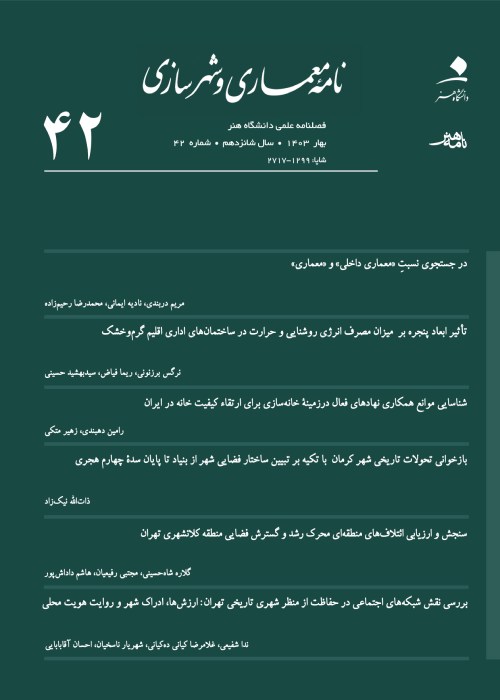Investigating Barriers to Cooperation Between Institutions in the Housing Industry to Promote Housing Quality in Iran
Author(s):
Article Type:
Research/Original Article (دارای رتبه معتبر)
Abstract:
From the first housing program, housing quality was controversial among politicians, programmers, and investors. While the challenge of quality was addressed at the time, the housing industry failed to provide satisfactory solutions for the ever-growing demand for quality. In Iran, we face a great gap between house buyers’ expectations and the options available in the market. However, research and practice fail to alleviate the problem. Recent research shows that investigating housing challenges in distinct disciplines, approaches, and methods results in limitations and deficiency of our efforts in addressing them. All individuals, institutions, and organizations should work in harmony to tackle issues like affordability and quality and achieve favorable results. Studies and interventions with local or small scope concentration will receive confrontation from other parts of the industry which attenuates the results. In this regard, this research addresses the private sector of the housing industry as it is responsible for delivering over 90% of the housing stock in Iran. The active individuals and institutions were identified, classified into three groups (i.e., designers, builders, and marketers), and modelled as a cyclic loop. A consortium was proposed to be established with the cooperation of all the institutions to make strategic decisions in a collective space. By considering the proposed framework as an effective way to overcome housing quality challenges, this research studies the barriers to cooperation and the solutions to them. We used reflective thematic analysis with a constructivist approach. The snowball sampling method was used to identify the institutions that have an impact on the housing quality in Mazandaran. All the key decision-makers in the institutions participated in the study. In sum, 23 participants were interviewed. The interviews went through three phases of coding and the themes were developed. Findings show closed communication channels were the main barrier to cooperation between the institutions. Having distinct purposes, lack of commitment to the group, distrust, lack of motivation, and denial of responsibility were the main reasons which led to the closure of the communication channels. Although there is a complex network of background situations responsible for each of the main themes stated, the mixture of governmental, private, and semi-private institutions in the housing industry, the mechanisms of the housing market, and the judicial procedures of the housing industry are the main predictors of the current behavior of the institutions. In addition, the findings show that the institutions working as builders are more inclined to work for housing quality than those working as designers and marketers. The sole solution for these barriers was found to be the enforcement of a law that can provide incentives for cooperation, punishment for misconduct, and standards for good actions. All the identified barriers are social in nature and can be mitigated by improving social skills. This research used a qualitative method, resulting in detailed and interpretive findings from a small sample size. We propose future research to address the issue using quantitative methods, building upon the current results in a wider context to enhance the generalizability of the findings.
Keywords:
Language:
Persian
Published:
Journal of Architecture and Urban Planning, Volume:16 Issue: 42, 2024
Pages:
45 to 64
magiran.com/p2707797
دانلود و مطالعه متن این مقاله با یکی از روشهای زیر امکان پذیر است:
اشتراک شخصی
با عضویت و پرداخت آنلاین حق اشتراک یکساله به مبلغ 1,390,000ريال میتوانید 70 عنوان مطلب دانلود کنید!
اشتراک سازمانی
به کتابخانه دانشگاه یا محل کار خود پیشنهاد کنید تا اشتراک سازمانی این پایگاه را برای دسترسی نامحدود همه کاربران به متن مطالب تهیه نمایند!
توجه!
- حق عضویت دریافتی صرف حمایت از نشریات عضو و نگهداری، تکمیل و توسعه مگیران میشود.
- پرداخت حق اشتراک و دانلود مقالات اجازه بازنشر آن در سایر رسانههای چاپی و دیجیتال را به کاربر نمیدهد.
In order to view content subscription is required
Personal subscription
Subscribe magiran.com for 70 € euros via PayPal and download 70 articles during a year.
Organization subscription
Please contact us to subscribe your university or library for unlimited access!


